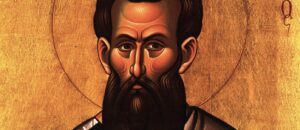The disputed saint and political power
VASSILIOS I. KALLIAKMANIS, PROFESSOR, DEPARTMENT OF THEOLOGY, UNIVERSITY OF THESSALONIK

“Anyone who wants to influence other people is practicing politics, and they are politicians. Politics is trying to organize Pauline in a new way of thinking. The saints are politicians. I never thought you could separate loyalty to the Saints from intellectualism.” These were the words of the English Byzantinologist Steven Runciman (1903-2000) in an interview with the journalists Chr. Arapoglou and L. Thomas on behalf of ET3, published on the website of the radio station Flash.gr.
The words of the English Byzantinologist may be surprising, but they raise a legitimate question: If a man is not prepared to minister to the people in a spirit of justice and self-denial, but also to sacrifice, if necessary, offices, wealth, fame, honor, and even his narcissism for the common good, can he practice politics? Because, the saints, throughout the ages, have been ready to go off the grid, to burn their “hut”, to go against the current, even to testify to their faith. And the adherence to the Orthodox faith was not aimed at self-interest, but at ensuring the spiritual freedom and salvation in Christ of all men.
The above is written on the occasion of the feast of Saints Constantine and Helen, which the Church celebrates on 21 May. Of course, the holiness of M. Constantine’s view of Byzantium has been hotly contested, especially after the mocking views against Byzantium expressed by the English historical philosopher Edward Gibbon (1737-1794). Gibbon, in order to harm Byzantium, had to “depose” the first Christian emperor. However, while Gibbon’s views have been deconstructed by later historians, culminating in the case of Runciman, in our country the questioning of M. Constantine was based mainly on these and reinforced by other ideological and political causes.
However, in the ecclesiastical consciousness, M. Constantine was recognized as a saint, the people revered him, built peristyle temples in his honor and baptized children in his name. Indicatively, some of his decisions before he was even baptized will be mentioned, which show the broad-mindedness, generosity and virtue of the man. That doesn’t mean he didn’t make mistakes. But the end result is very positive.
First of all, the cessation of persecution and the recognition of tolerance were decisive not only for the course of Christianity but also for the humanization of Greco-Roman society, which was in decline. The convergence of the First Ecumenical Council and the contribution of M. Constantine’s contribution to the pacification of the Church, which also means the pacification of the people, is considered a catalyst. Important was his decision to ban the worship of the emperor and the honour of the emperor as God. In addition, reforms in the tax system and the protection of the weak, the control and rewards of the advantaged and the search for moderation in administrative matters have halted the decline and boosted growth and progress.
Furthermore, M. Constantine provided in wars not only for his soldiers, but also for captured barbarians, overturning the prevailing perception of the time. He ordered the soldiers, when they won a battle, to respect the lives of the prisoners, because they too, as human beings, are of “homogeneous nature”. He reined in the anger and lured them with money so that they would not kill the weak prisoners. With Constantine’s prudence “myriads of the barbarians were being taken away”, notes Eusebius. g) St Chrysostom writes: “One man can change a whole demos”. And indeed the lives of Saints Constantine and Helen changed the course of history. They laid the foundations of a more humane state by placing the Gospel of love and justice at its centre. Byzantium may not have developed a clear political theory, but the Roman concept of the emperor’s reserves was considered irreverent and the view was formed that every office was intended to serve the citizens. The notion that power comes from God also referred to the way it is exercised. In other words, it reminded us of the sacrifice of Christ on the cross, whom the secular ruler needs to imitate in order to save his people.
Saint Patience and Constantine Palaiologos
α) The sign of the cross revealed to Constantine the Great, the first Byzantine emperor who helped to establish the Christian faith, did not merely herald the solemn vindication of Christianity. It both sealed and underlined the truth that he who assumes any power must be ready to sacrifice himself for his people or with his people.
b) Thus the last emperor of Byzantium, Constantine Palaiologos, refused to capitulate and voluntarily surrender the administration of Constantinople to the enemies, even though he saw the coming destruction. He also refused to leave the city, as recommended by the senators and the Patriarch. “My removal may be favourable to me,” he replied, “but it is impossible for me to leave. How can I leave the churches of our Lord, and the throne, and my people to such evil?”
c) This ethos had obviously been taught to him by his large and best mother, Empress Helen, wife of Manuel II Palaiologos (1349-1425), who raised six boys and two girls. After the death of her husband, Eleni left the secular palace and lived for 25 years in the monastery of Kyra-Martha as a nun named Patmos. She died a few years before the fall and the Church honours her as a saint and celebrates her on 29 May. Saint Patience may have chosen the solitary cell, but she always inspired a brave, peaceful and sacrificial spirit in her children.
d) It is characteristic that when Constantine Palaeologus sent his brothers Thomas and Demetrius to Mystras as commanders, between whom there was some coldness, Patience did not remain only in the etiquette greeting. She summoned to the monastery the emperor and her son, her other two children, the senators and her common friend Franzis, and after advising them, she bound them with oaths to observe the agreements and conventions, “that none of the other’s lands and boundaries will be overrun and seized, but that they will cooperate peacefully”. She succeeded, as a good educator and an excellent mother, the “homonym”. And this was always the case, as George Plethon – Gemistos notes. Thus her sons were unanimous and with the authority of maternal intervention “quietly and quietly resolved their differences”.
ε) Saint Patience did not only benefit her family. Everyone who was close to her reaped spiritual fruits. This is typical of what Gennadius Scholarios, who after the Deposition became Patriarch, says: When a wise man visited her, he was amazed by her wisdom. When an ascetic met her, he would leave, after the meeting, ashamed of the poverty of his virtue. When a wise man met her, he became richer with more wisdom. When a legislator saw it, he became more careful. When a judge conversed with her, he found that he had before him a practical rule of law.
f) And the Scholar continues: When a courageous person visited her, he felt defeated, surprised by her patience, prudence and strength of character. When she was approached by a philanthropist, she acquired a stronger sense of charity. When she was met by a friend of the entertainers, she became prudent, and repented, recognizing in her face the humiliation. When a piety zealot got to know her, he became more zealous. Every man in pain was soothing his pain near her. Every arrogant man curtailed his philanthropy. And generally speaking, there was no one who came into contact with her who didn’t become better.
g) In Byzantium it was a phenomenon that emperors, members of imperial families, men and women, or other officials who had exercised administration, converted to monastic life after an event. However, the abandonment of worldly offices and the choice of “emphilosophical monastic life”, “practical philosophy”, exercise and prayer, were accompanied by different motives. Some of them were “disgraced”, disgraced or disqualified from their office, and in order to be taken to prison or exile they were forced to be confined in a monastery. There were, however, those who voluntarily abandoned the worldly world and lived “in penance”, such as Saint Patience, who became a model of a wife and mother, but also a model of bony life.















